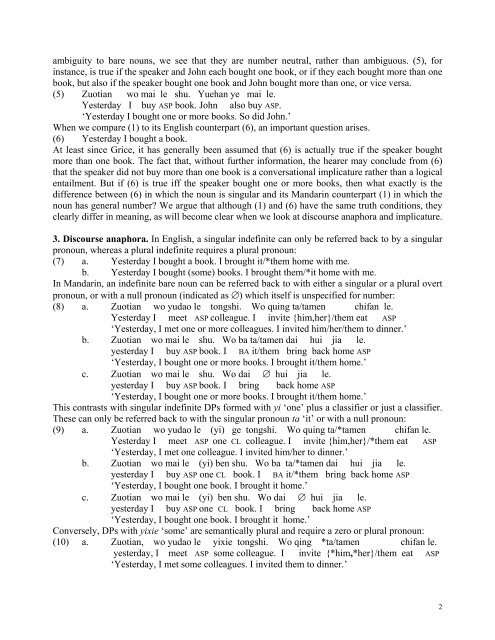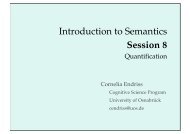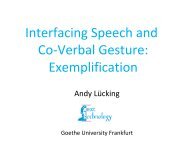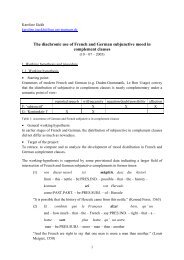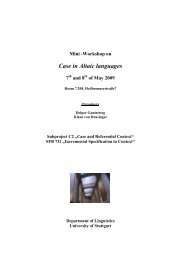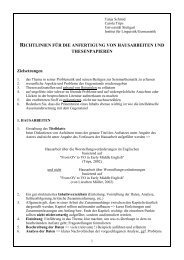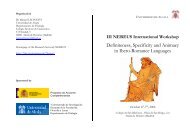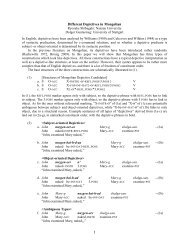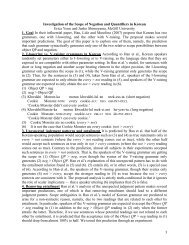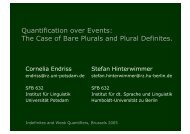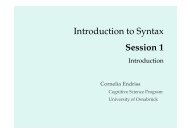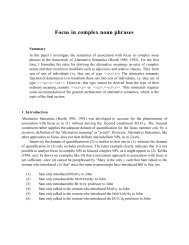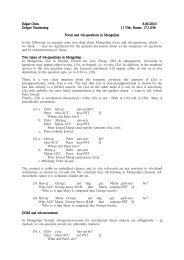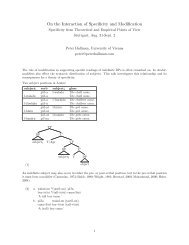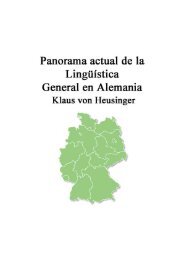SemPrag03.Progr.pdf - Institut für Linguistik/Germanistik - Universität ...
SemPrag03.Progr.pdf - Institut für Linguistik/Germanistik - Universität ...
SemPrag03.Progr.pdf - Institut für Linguistik/Germanistik - Universität ...
Create successful ePaper yourself
Turn your PDF publications into a flip-book with our unique Google optimized e-Paper software.
ambiguity to bare nouns, we see that they are number neutral, rather than ambiguous. (5), for<br />
instance, is true if the speaker and John each bought one book, or if they each bought more than one<br />
book, but also if the speaker bought one book and John bought more than one, or vice versa.<br />
(5) Zuotian wo mai le shu. Yuehan ye mai le.<br />
Yesterday I buy ASP book. John also buy ASP.<br />
‘Yesterday I bought one or more books. So did John.’<br />
When we compare (1) to its English counterpart (6), an important question arises.<br />
(6) Yesterday I bought a book.<br />
At least since Grice, it has generally been assumed that (6) is actually true if the speaker bought<br />
more than one book. The fact that, without further information, the hearer may conclude from (6)<br />
that the speaker did not buy more than one book is a conversational implicature rather than a logical<br />
entailment. But if (6) is true iff the speaker bought one or more books, then what exactly is the<br />
difference between (6) in which the noun is singular and its Mandarin counterpart (1) in which the<br />
noun has general number? We argue that although (1) and (6) have the same truth conditions, they<br />
clearly differ in meaning, as will become clear when we look at discourse anaphora and implicature.<br />
3. Discourse anaphora. In English, a singular indefinite can only be referred back to by a singular<br />
pronoun, whereas a plural indefinite requires a plural pronoun:<br />
(7) a. Yesterday I bought a book. I brought it/*them home with me.<br />
b. Yesterday I bought (some) books. I brought them/*it home with me.<br />
In Mandarin, an indefinite bare noun can be referred back to with either a singular or a plural overt<br />
pronoun, or with a null pronoun (indicated as ∅) which itself is unspecified for number:<br />
(8) a. Zuotian wo yudao le tongshi. Wo quing ta/tamen chifan le.<br />
Yesterday I meet ASP colleague. I invite {him,her}/them eat ASP<br />
‘Yesterday, I met one or more colleagues. I invited him/her/them to dinner.’<br />
b. Zuotian wo mai le shu. Wo ba ta/tamen dai hui jia le.<br />
yesterday I buy ASP book. I BA it/them bring back home ASP<br />
‘Yesterday, I bought one or more books. I brought it/them home.’<br />
c. Zuotian wo mai le shu. Wo dai ∅ hui jia le.<br />
yesterday I buy ASP book. I bring back home ASP<br />
‘Yesterday, I bought one or more books. I brought it/them home.’<br />
This contrasts with singular indefinite DPs formed with yi ‘one’ plus a classifier or just a classifier.<br />
These can only be referred back to with the singular pronoun ta ‘it’ or with a null pronoun:<br />
(9) a. Zuotian wo yudao le (yi) ge tongshi. Wo quing ta/*tamen chifan le.<br />
Yesterday I meet ASP one CL colleague. I invite {him,her}/*them eat ASP<br />
‘Yesterday, I met one colleague. I invited him/her to dinner.’<br />
b. Zuotian wo mai le (yi) ben shu. Wo ba ta/*tamen dai hui jia le.<br />
yesterday I buy ASP one CL book. I BA it/*them bring back home ASP<br />
‘Yesterday, I bought one book. I brought it home.’<br />
c. Zuotian wo mai le (yi) ben shu. Wo dai ∅ hui jia le.<br />
yesterday I buy ASP one CL book. I bring back home ASP<br />
‘Yesterday, I bought one book. I brought it home.’<br />
Conversely, DPs with yixie ‘some’ are semantically plural and require a zero or plural pronoun:<br />
(10) a. Zuotian, wo yudao le yixie tongshi. Wo qing *ta/tamen chifan le.<br />
yesterday, I meet ASP some colleague. I invite {*him,*her}/them eat ASP<br />
‘Yesterday, I met some colleagues. I invited them to dinner.’<br />
2


